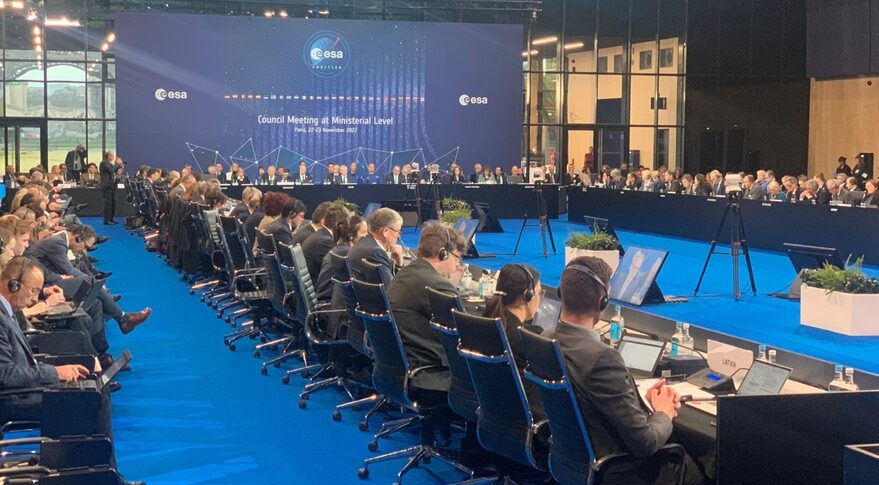
PARIS — As European ministers gather to allocate funding for European Space Agency programs for the next three years, agency leadership is optimistic about winning support for its priorities.
Ministers gathered here Nov. 22 for the start of a two-day meeting where ESA’s 22 full member states and several associate states will formally commit to funding programs from exploration to space transportation. ESA Director General Josef Aschbacher has put forward a package of programs at a total cost of 18.7 billion euros ($19.2 billion), an increase of about 25% from the previous ministerial in 2019.
In comments at the opening, public session of the meeting, Aschbacher made what was, in effect, a closing argument for that package, arguing that nations needed to invest more in space despite challenges such as inflation, an energy crisis and the ongoing war in Ukraine.
“We must take bold decisions today. As I’ve said before, we must invest in the future because we are in a crisis,” he said after outlining the components of the program he is asking members to fund.
In a briefing with reporters late Nov. 21, Aschbacher and Anna Rathsman, chair of the ESA Council, said they were going into the ministerial feeling confident and better prepared than past meetings, when agreements came together at the last minute.
“It looks good,” Rathsman said after a final meeting to finalize resolutions for the ministerial. “There are a lot of different views among the 22 member states, of course, when you discuss things, but I think they’re very constructive. There’s a willingness to really find a way forward.”
“I’ve been to many ministerial conferences myself, and I’ve never seen it go so fast, so early,” Aschabcher said.
Smooth planning, though, doesn’t guarantee that funding will follow. The ministerial will feature, largely behind closed doors, debates and negotiations about what programs countries will subscribe to and with what amounts. Among the key issues is a request for 750 million euros as ESA’s contribution to the European Union’s secure connectivity constellation, recently named Infrastructure for Resilience, Interconnectivity and Security by Satellite or IRIS².
ESA also needs 700 million euros to restructure the ExoMars mission after ESA cut ties with Russia earlier this year, although the agency is looking for only half of that at this ministerial meeting. That would enable ExoMars, previously planned to launch in September on a Russian rocket with a Russian landing platform, to launch no earlier than 2028 with European replacements for those Russian elements.
While ESA is seeking significant funding increase overall, that is not apportioned equally among all programs. ESA’s science programs, for example, will get an increase only enough to cover inflation.
That flat funding comes after a modest increase ESA won for science at the previous ministerial in 2019 in Seville, Spain. “We all fought very hard in Seville to get this modest increase, but inflation is taking it away,” said Günther Hasinger, ESA science director, at the Nov. 21 briefing. “The economic boundary conditions are such that we cannot afford a big uplift.”
He said that the lack of a funding increase will not affect missions already in development, although one large one, an X-ray telescope called Athena, is undergoing restructuring and a likely delay because of development issues and cost growth. Hasinger said ESA will instead delay later missions.
One reason for the disparity is that science programs are “mandatory” programs, with all ESA members contributing to them based on their gross domestic product. Optional programs, on the other hand, give member states more flexibility in what programs to support and by how much.
“Everyone believes that the science program is extremely important. On the other hand, the number of optional programs that really have a good purpose is growing all the time,” said Rathsman.
Nicolas Walter, chief executive of the European Science Foundation, raised concerns about science funding in remarks at the ministerial council’s opening session. “We’re concerned that declining purchasing power will decrease the scope and the scale of the program, including the enabling technologies for future missions, and thus we encourage increased investment as soon as possible,” he said, calling for that increase no later than 2025 ministerial.
In opening remarks at the ministerial, several member states announced their intent to increase their contributions to ESA programs, although typically with few details about the amount of the increase or how it would be allocated among those programs.
French economic minister Bruno Le Maire, who served as the host of the ministerial council meeting, told reporters before the opening session he was confident that ESA would secure its full request. “I’m confident because I think that this space cooperation and this space vision is absolutely key for the independence of Europe,” he said. “So I’m quite confident that the financing of space and European ambitions will be a priority for all the member states.”